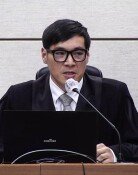[Editorial] Chinese ambassador¡¯s candor questioned
[Editorial] Chinese ambassador¡¯s candor questioned
Posted November. 17, 2000 14:56,
The statement by China's Ambassador to Korea Wu Dawei at the breakfast meeting hosted by the Korea Press Foundation leaves a bit of suspicion as to whether the ambassador had the appropriate self-control and the virtue of modesty fit for such diplomatic responsibility.
"The Dalai Lama hides behind the veil of religion as he pushes onward his separatist fight for Tibetan independence,¡± the ambassador said. ¡°Awarding the Nobel Peace Prize to the man has made a mockery of the Prize itself."
Such statement by Wu goes against the grain for Koreans who have long awaited the visit by the Dalai Lama on a purely cultural and religious level and as we revel in having one of our own receive such prestigious prize as the Nobel Peace Prize.
Furthermore, some time ago, Wu made a half-veiled statement of threat concerning the possibility of the Dalai Lama's visit to Korea: "The Dalai Lama's visit to Korea might not necessary lead to a break in the relationship between Korea and China.¡±
Concerning the possible reopening of talks for commercial airline flights between Korea and Taiwan, Ambassador Wu said, "As it also infringes on the question of national sovereignty, there is a need for prior consultation with mainland China."
Although Korea does indeed have a single-nation policy toward China, such requirement to first consult with China could be taken as one that denies the existence of interchange both in terms of human resources and goods between the Korea and China. Moreover, the statement could be misunderstood and taken as an affront to our national pride.
Ambassador Wu's direct verbal accusation that the United States and United Kingdom "have been the prime movers in Tibet's fight for independence" and that the current confusion in the U.S. presidential election resulted from the fact that the United States tends to "think only of its own ideologies and ideas as it stresses them to others, leading to failure."
Such statements also raise questions concerning whether such verbal criticisms befit a diplomat. As the question of the U.S. Army's presence in Korea is a sensitive issue that involves South and North Korea, as well as the major superpowers in the region, such statements by a diplomat reflecting personal views ought to be curtailed.
During his post in Korea, he has on occasions made several such questionable statements.
"I feel it is a breach of international principle for the U.S. to seek on-site inspection of the Kumchang-ri facility in China" (Jan. 7, 1999).
"The issue surrounding the North Korean escapees is one between China and North Korea" (Sept. 2, 1999).
"Chinese companies export crabs to Japan and the U.S., as well. Why are lead pellets found only in those shipped to Korea?" (Sept. 8, 2000).
For greater peace and stability on the Korean peninsula, greater amicable relations between Korea and China must be promoted. For such promotion, both must avoid any action that breaches the principle of mutual benefit and avoid fostering a relationship other than on equal footing.
It is with such in mind that we question the statements made by Ambassador Wu. It also raises questions concerning what actions the Korean government should take.






![“설거지해도 그대로”…냄비 ‘무지개 얼룩’ 5분 해결법 [알쓸톡]](https://dimg.donga.com/c/138/175/90/1/wps/NEWS/IMAGE/2026/01/15/133164664.3.png)
